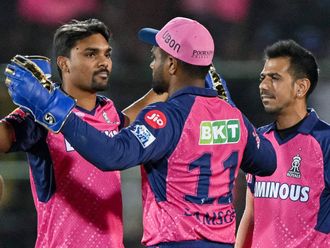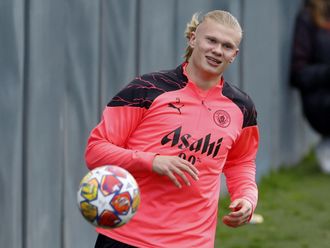London: The old Wembley Stadium was used to witnessing dramatic events. Its most historic day came in 1966 when Bobby Moore's England carried off the World Cup.
Three years before that, however, on the night of June 18, 1963, one of British boxing's greatest-ever coups was enacted there when Henry Cooper knocked Muhammad Ali (then called Cassius Clay) to the canvas with "Enery's ‘ammer", a blistering left hook. It was the first time the future world champion had ever been floored.
It tells us something about the level of the nation's ambitions that this punch is regarded as one of the high spots in British sport. Images of the moment still sell as commemorative photographs nearly 50 years on.
And that's despite the fact that Cooper, blinded by the bloodied mess his face became, went on to lose the fight in the next round. We do love a heroic loser. Dunkirk all over again.
By some accounts, though, Henry shouldn't have been a loser that night. As Ali reeled from the killer punch, his armpit caught in the ropes and his glove became entangled. He sank slowly to the canvas, as one writer put it, "like a carelessly thrown sack of potatoes".
Had he not been caught up in the ropes, his head would have hit the canvas with a thud that might have laid him out. At the count of four, the bell rang for the end of round four and he got up and tried to stagger to his corner — "doing a fair impersonation of Groucho Marx's walk", according to one observer.
Ali's canny trainer, Angelo Dundee, steered him to the corner, which was illegal, and later admitted to tugging at a tiny tear in the glove (which was even more illegal) and calling for a replacement, which took at least a minute to arrive. By this time he had applied smelling salts to his boxer, which was also illegal, and restored him to his senses.
Crafty work
Never a man to bear grudges, Cooper spoke philosophically about this episode: "There was undoubtedly some crafty corner work, but I expect someone would have done the same for me".
Ali then went out in the fifth round with both hands blazing and blasted at the scar tissue thinly protecting the notoriously weak area around Cooper's eyes until the referee had to step in to save further bloodshed. One writer said after the fight: "There hadn't been so much blood in the London prize ring since the inception of boxing".
Cooper was actually ahead on points at the time. Since that fight a spare pair of gloves has had to be kept in each corner. Cooper was two stone lighter than his opponent and had prepared for the fight of his life without the benefit of a trainer.
Ali, not surprisingly, puts a different gloss on events in his memoir. "I dropped my guard and glanced down at ringside at a screaming woman — Elizabeth Taylor, with her husband, Richard Burton — and suddenly something exploded against my jaw." So it was all Liz Taylor's fault. Ali paid tribute to the power of the punch, though, recalling 40 years later that "Cooper hit me so hard my ancestors in Africa felt it".
From that moment '"Our Enery" was taken to the people's hearts and over the years grew into a national treasure. An honest man in a dirty business, Cooper deserved the accolade, moving with affable ease from sport to showbusiness after he retired from the ring, charming television audiences and the profitable after-dinner speaking circuit until deafness cut back his appearances.
He was given an OBE in 1999, a knighthood a year later from the Queen and a Papal knighthood from the Vatican (he had become a Roman Catholic when he married his Italian wife, Albina) for services to boxing and for the extensive work he did for charity.
Cooper was the first person to win the BBC Sports Personality of the Year award twice (in 1967 and 1970) and is one of only three double-winners in the award's history — the others are Damon Hill and Nigel Mansell.
He was a popular chairman of the TV quiz show, A Question Of Sport, and famously advertised an aftershave and a breakfast cereal. More recently, he fronted a National Health Service campaign to persuade older people to get flu vaccinations —
"Get Your Jab in First!" Henry played serious golf, running pro-am and celebrity tournaments until his old age. He won 40 of his 55 professional fights between 1954 and 1971, becoming British, Commonwealth and European heavyweight champion.
Most of his losses were in the early years and he got better with age and experience. Indeed, he is the only British boxer to have won three Lonsdale belts in defence of his crown.












